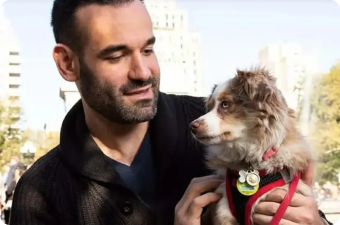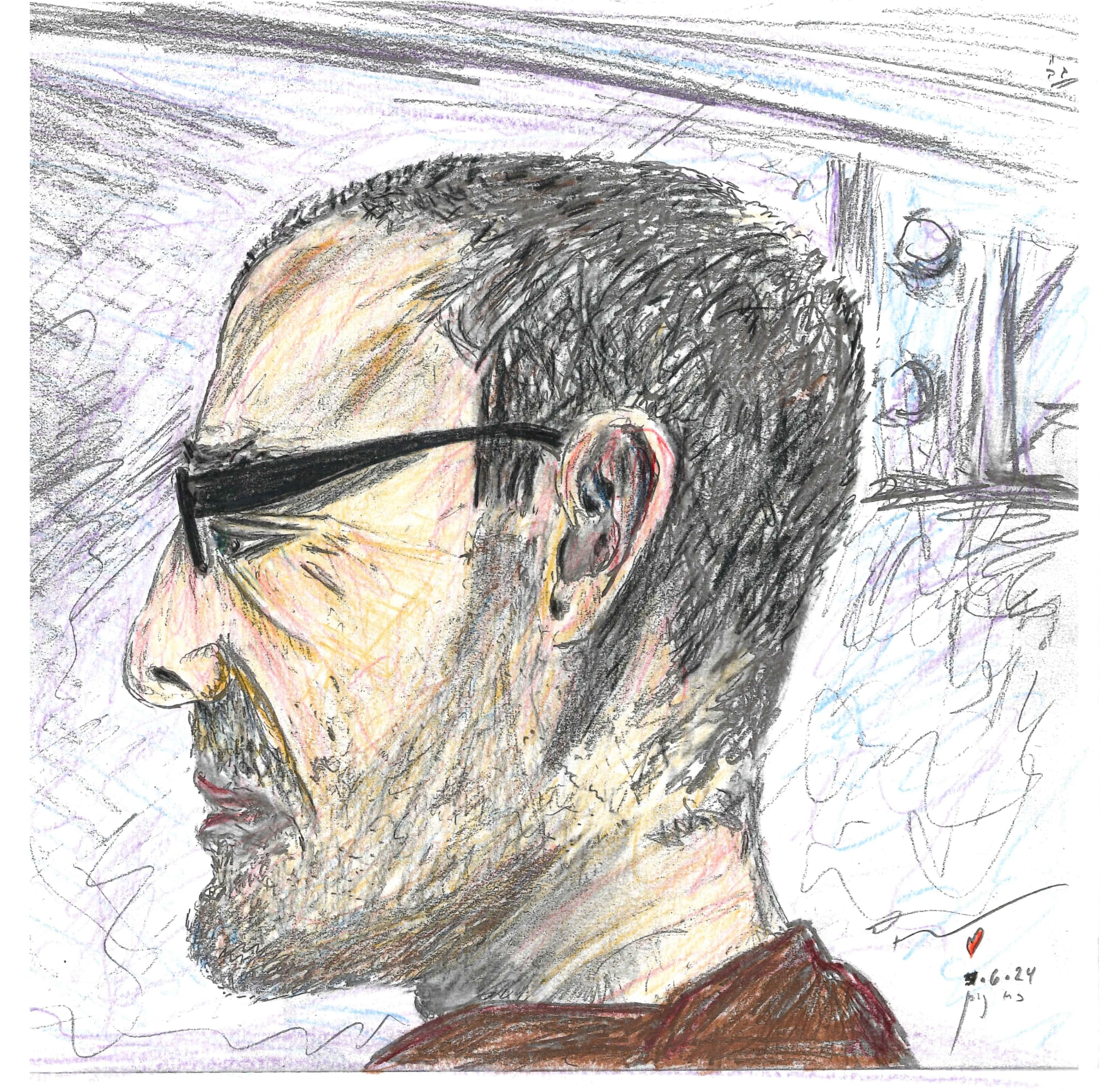“Most people are standing, here, with one foot in the past and one in the future,” Zater says, drawing a man on a lined notebook sheet, “But they’re looking and leaning back, like there’s a mattress against the wall in the past, and they fall into it and it bounces them forward, but they just keep projecting more of the past into their future.”
Zater is a better yoga instructor than an illustrator*, but the point is clear. You are either focused on the past or the future. If you focus on the past, you repeat it.
In Eastern cultures, the future is seen as coming from behind the person, with the past in front of them. This makes sense even to a Western mind. Most of our schools of Philosophy and Psychology preach that our entire worldview is informed by our past experiences, thoughts, and genetic makeup… Everything we “see” is colored by our past.
Except it’s not. That’s wrong.
In this week’s Torah Portion, Vaera, we are told “the Children of Israel did not heed Moses, because of insufficiency of spirit (kotzer ruach) and hard work.” (Ex 6:9).
Sphorno, an Italian commentator, explains the sentence as *due to* the hard work inflicted on Israel, they allowed their “spirit” (ruach) to be diminished.
Shadal, quoting Rashi, says that the translation is literal, they were “short of breath” — because someone who is full of anxiety finds it difficult to breathe. Anxiety is the opposite of faith — if you’re comfortable that everything’s going to work out, you breathe easy.
It is interesting that the Torah associates breath with spirit — it’s the same word, Ruach.
Kabbalists suggest that “Ruach” is one of the 5 parts of our soul (Nefesh, Neshama, _, and _ being the others).
Sages and Rabbis credit often credit intuitive inspiration or understanding (that falls short of actual prophesy) to “Ruach HaKodesh”, a holy spirit or wind, aka divine inspiration.
Shadal makes clear that the Jews recognized “who”, Hashem was, who was reminding the Children of Israel, through Moses, of His promises to the forefathers, and suggests that the use of this name (“YKVK”) is a mix of fear and awe (from the sounds Yah and Wah) — that G-d will deal harshly with the evildoers, and inspire awe among the Israelites and others: “Therefore say to the Children of Israel: ‘I am Hashem, and I shall take you out from under the burdens of Egypt; I shall rescue you from their service; I shall redeem you with an outstretched arm and with great judgements. I shall take you to Me for a people and I shall be a G-d to you; and you shall know that *I am Hashem* your God, Who takes you out from under the burdens of Egypt. I shall bring you to the land about which I raised My hand to give it to Abraham, Isaac, and Jacob, and I shall give it to you as a heritage — I am Hashem”. (Ex 6:6-8)
The Jewish people, the first time Moses pitches them in this week’s Parsha, have lost their focus on the future.
They know of the promises G-d made to Abraham, Isaac, and Jacob, and they know of the deeds He did for these forefathers, but instead they are stuck mentally on the “hard work” at hand.
As Zater would say, they are leaning into the past, rather than into the future. They are stuck on their current challenges, forgetting the incredible power and opportunity G-d presents.
In Prison you see this constantly. When you suggest a change or improvement, you’re often immediately hear a refrain about how “change is impossible”, “nobody cares”, “BOP stands for Backwards on Purpose”, and even “bad things happen to those who try to improve things”, “they will retaliate”, etc.
You hear this in life, often, too. Everyone thinks of why something won’t work — the trick is to believe (and persist)
regardless. There is an almost imperceptible line between delusion and faith — most great achievements and astounding victories began as wild dreams.
Such was the mindframe of the Israelites in Egypt, who as a result of their lack of “spirit”, Sphorno explains, are punished with not seeing the promised land (their kids get in, instead). This is the price paid for living in the past, for being stuck in the burdens instead of in the future. You stay there, where you are, rather than arrive to your dream.
“What the guys who stay healthy and get out successfully have in common,” Zater says, “is they are intensely future focused.”
For me, daily sketching and journaling, listing the things I’m grateful for, and the things I’m looking forward to doing, building, helping, and experiencing, get me through the day — despite great physical pain and illness at times (it’s a very unclean and unhealthy place, and the diet is also toxic).
I’m not always successful, and there are times of sadness and pain, but when I catch myself in them, I get to focusing on the future, thinking about something friends I’d love to see, loved ones I look forward to hugging (including a fluffy puppy!), music I’d love to play, shows I’d love to do, causes I’d love to help, and designs I’m excited to see become real. These dreams are more powerful than the past, which is painful, but no longer real (if it ever really was).
Prison, and life, are full of people stuck in the past. You see this in the epidemic of mental illness that fills the beds, and the staff positions.
The rate of PTSD among staff, many who are ex military, is astounding. Some admit it outright, some make it obvious through their actions and reactions. Of course, many men “inside” suffer it, too. Some got it inside (Pens and Mediums are violent places, and that violence shows up in Lows and Camps, too, at times), but most bring it with them. Many veterans with PTSD find themselves here — often saying how they “lost touch” with reality, being stuck replaying a past trauma in their heads. Of course, many were victims of abuse as children, and with such a powerful worldview stamped on them by their guardians, they find it difficult to see the world otherwise.
PTSD might better be called “Rewind and Replay Disease”, because it is our brains replaying the same trauma over-and-over, the same abuse or injury or catastrophe, nonstop, seemingly without end. It is a disease of the past — and it can’t stop until we internalize that it’s not real, that the past is not here in the room with us.
The same is true for other “diseases of control” like OCD, Depression, and Anxiety (each person’s experience is unique — diagnostic labels are inaccurate and often wrong, but for now we’re speaking generally), where the brain remains stuck in an old map of the world, replaying an old video endlessly, trying to “control” and “fix” what has already occured and is not “real” anymore.
The first step, is for the person to realize it’s time to change the video from one of the past to one of the future. In the 12 Steps, this is recognizing you’ve got a problem. For someone with PTSD or addiction (addictions are escapes), it is recognizing that they’re stuck in a false reality that isn’t serving them, and is often causing harm to others.
The next step? Plugging into the Spirit — the Ruach — knowing there is something greater than all of us guiding us, a loving energy that wants the best for us. This is the surrender to a higher power, to G-d.
The Torah is clear in Va’aiera and in Bo, that the reason for the 10 Plagues is not primarily to punish the Egyptians, but to “wow” the Israelites, to restore and strengthen their faith. Over and over, G-d tells Moses and daily), to keep it bound by their hearts and eyes (Teffilin), and to speak of it at home, on the road, resting and waking, for generations.
From here, we understand the “Kotzar Ruach” — the diminished spirit, the inability to breathe calmly, with faith —
and we understand the response: wonderous miracles to inspire the Jewish people to believe, not only then, but for generations, until today.
Simply put: This week we are taught and reminded by G-d that there is nothing He cannot do for us, no miracle out of reach, no prayer unanswerable. We are taught to never lose faith.
In light of this, how we approach life, and even how we as a society approach “Justice” and prisons, needs a change.
Yes, the work is hard, but no, we cannot remain faithless. We must believe that everyone can be redeemed, ourselves and others. Yes, it may be difficult, but it’s possible.
A prison that believes in the potential for G-d to save everyone, and that everyone is a child of G-d, does not merely warehouse men who have (allegedly) made mistakes, but works to uplift them, to help them recognize their worth, their G-dliness, and the worth of others.
It helps them stand on their feet and support others, through education, behavior skills, job training, healthy diet, and fitness.
These things may appear on the brochures and websites, but the food here is toxic, the beds are best compared to warehouse shelving with a 2″ foam topper (and they threaten to take away any extra padding as punishment —
physical pain nightly as punishment!), the education is a failure (1-in-3 pass their GED!) and there are few courses that will result in a livable wage, and the place is built as if one were trying to prevent sleep, safety, and calm.
You wouldn’t house your favorite pet in a place like this, but we expect men to redeem themselves here — the actions speak louder than the websites and brochures. The results or lack thereof speak loudest.
The same is true for sentence lengths — a man of 22 is not the same person 10 years later, but we hand out 20-
50 year sentences like they make sense. No other civilized country does this.
Civilized countries across Europe, and worldwide, issue shorter sentences (even doing away with life sentences for murderers!) and then *treat* and educate the men and women so they emerge as contributing, valuable, loving members of society.
Sure, it may feel cathartic to punish evil deeds with harsh sentences, but pouring pain on top of pain does not undo harm, nor does it bring back the dead, un-rob a business, or heal a victim.
There are some men who are dangerously insane, but they are the exception — 90% of men in prison probably do not need to be here, and certainly not longer than 5 years.
And if we want prison to “reform” individuals we must admit our current methods fail. In the USA, more than 70% of men in prison will return — our system is a failure top to bottom.
Focusing on the past, punishing instead of building, is failing — our obsession with the past deeds instead of the future potential of each man and woman in the system is only getting us more of the past! We are self-inflicting this nation with a PTSD of crime and drugs and failure.
Like the Israelites in this week’s parsha, we are stuck in the burden even though we know there’s a promised land!
We must change.
We need a system of Justice that focuses on building a dream future, not punishing the past.
FOOTNOTES: **This is also the thesis of “Zen & The Art of Motorcycle Maintenance” — that we know what is “Good”, a priori, because we are all connected-to and part of the universal “One” found in all faiths — though, he failed to trace it back to Judaism. (Knowing this doesn’t spoil the excellent book, a must read — thanks to my friend Esther for recommending!))
*Seeing this will inspire him to become a remarkable visual artist, studying all schools of thought and practice, and honing his skills for 2 hours per day. I’m kidding, but would not bet against it.
***I don’t. I went to Brandeis and always wanted to show up with a 3-fingered foam hand and chant “We’re Division Three”, but I didn’t have enough school spirit for even that!


